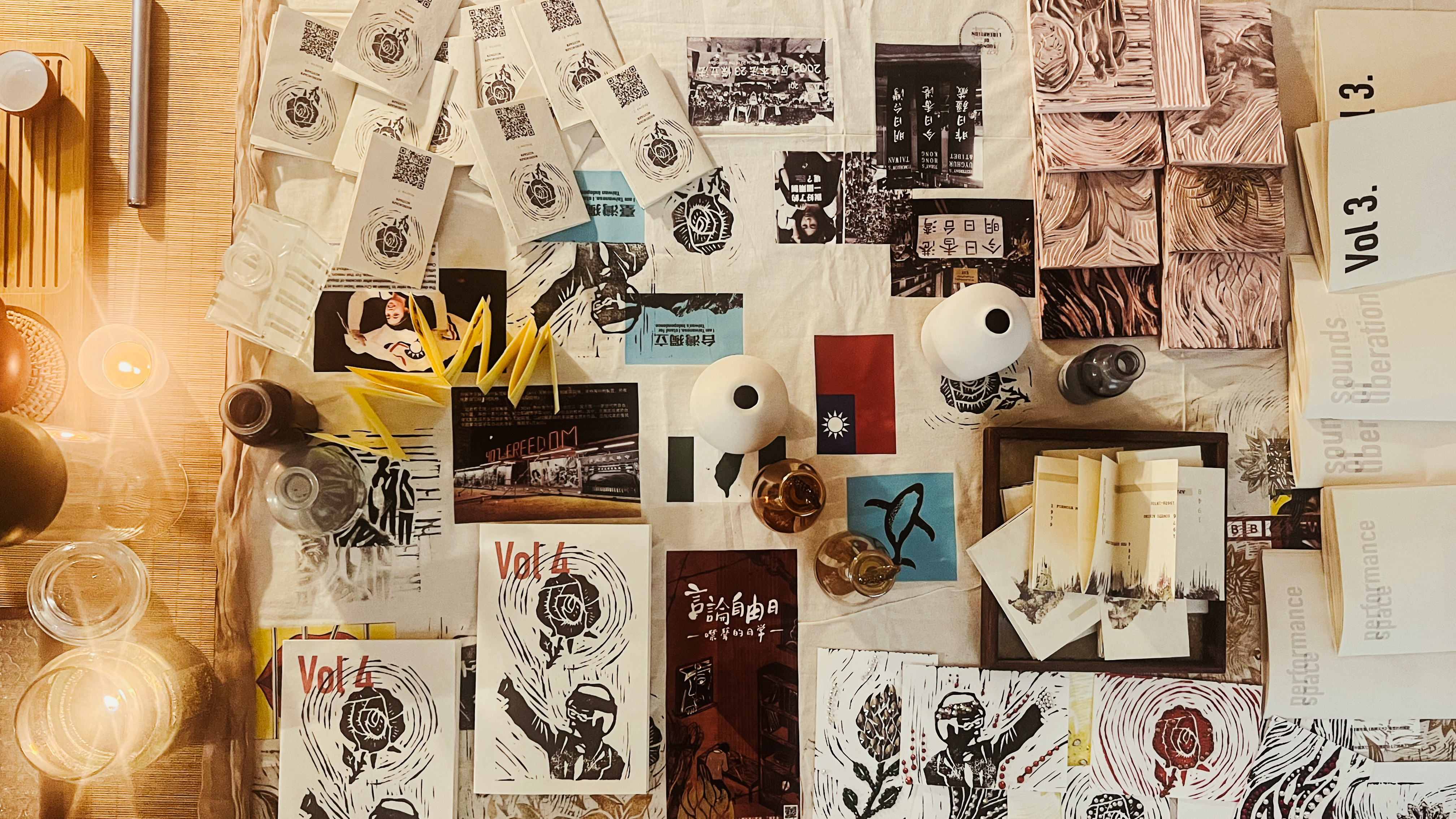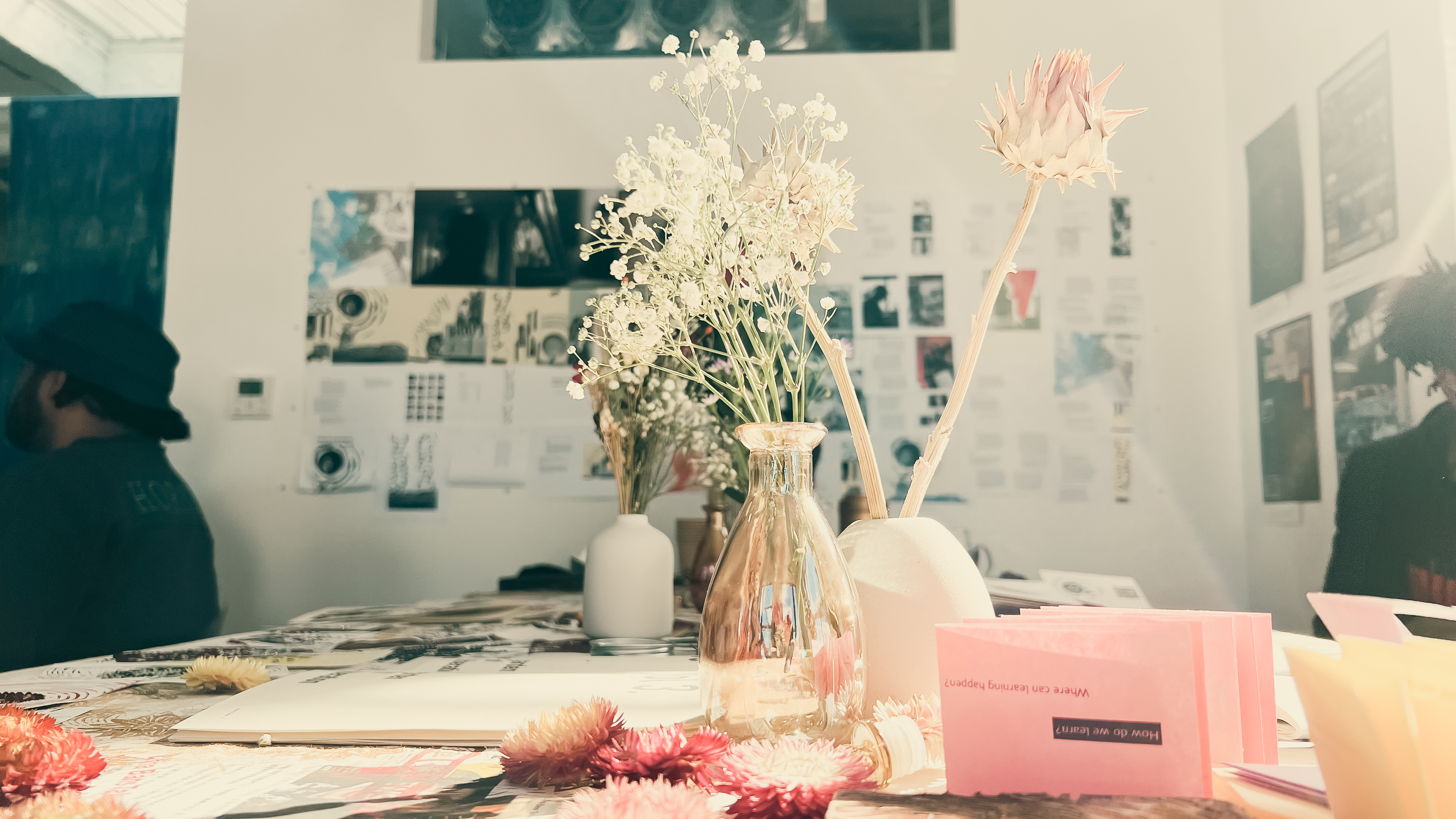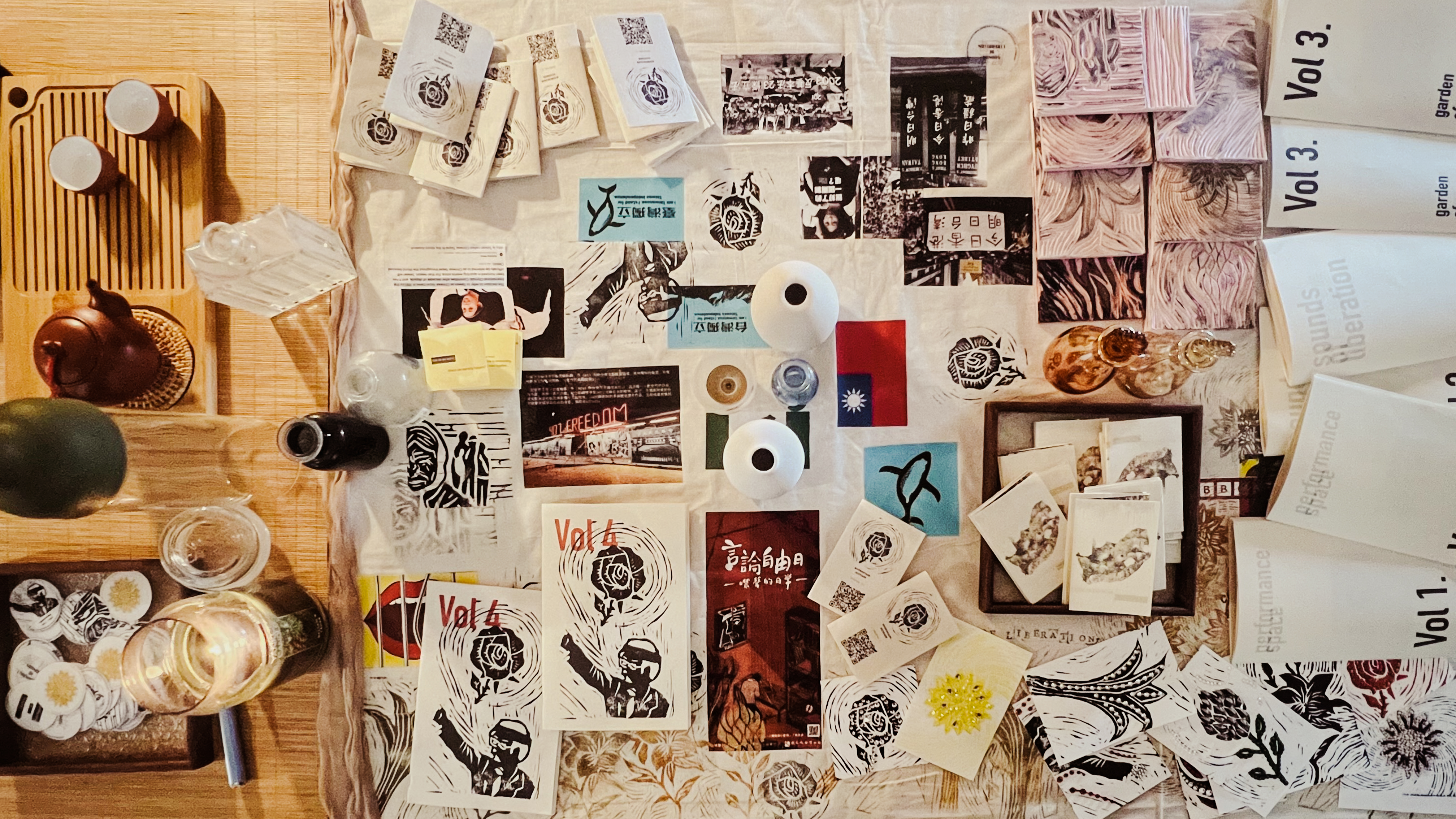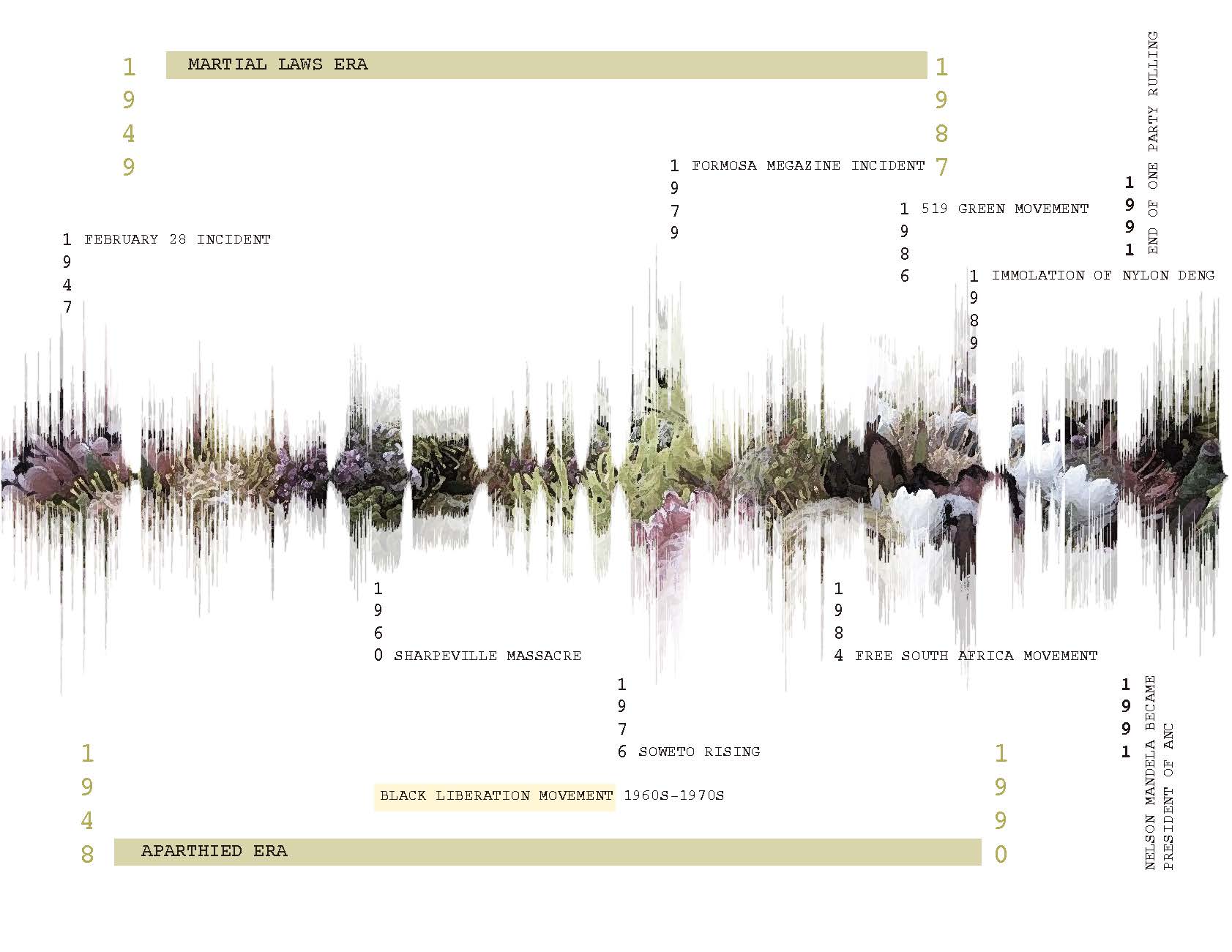Sounds of Liberation:
Course: Studio Spring 2024
Instructor: Ilze Wolff
Inspired by Abdullah Ibrahim’s iconic album “Mannenberg, Is Where It’s Happening”, I delve into the role of anthems within apartheid in South Africa, Arguing that plays a role across protests as an embodiment of cultural resilience.
As an immigrant from Taiwan, I’m intrigued by Taiwan’s own journey towards liberation. Venturing deeper into Taiwan, from its colonial history to martial law, we uncover the stories of courageous individuals like Nylon Cheng, who self-immolated after defying censorship and fought for free speech. Knowing that the freedom we have now didn’t just happen overnight, but through countless struggles and revolution.
How do we learn? Where could learning happen?
This project isn’t just about the past, it connects historical movements with contemporary challenges, explore the parallels with global events and understand the ongoing struggles through immersive storytelling, as a tribute to all the wonderful lectures and experiences from our Cape Town trip. In this project, I stepped away from the typical way of how we learn, instead, moving towards emancipatory learning experience through undoing sound, publications and storytelling.


A safe space, where the stories could be told and the voices could be heard.
In 1974, after moving to New York for almost a decade, Abdullah Ibrahim had a brief visit to Cape Town and recorded this iconic album:
Mannenberg, Is Where It's Happening
The song was an instant hit after release and was frequently played at rallies protesting against the government, including the Soweto Uprising - a series of demonstrations that took place after South African police fired upon protesting students in June 1976.
The beautiful melody and catchy beats of Mannenberg represented the freedom and cultural identity of South Africans, and became the most powerful anthem of struggles in the 80s.
Inspired by Abdullah Ibrahim’s works which serve as a form of liberation, a way to recreate home while he was far away, and to bring people together.
I can’t help but wonder, as an emigrant from Taiwan myself, what’s our sounds of struggles and liberation?
(親愛的媽媽)
Island Sunrise.
(請你..)
The Taiwanese indie rock band Fire Ex created this song for the sunflower movement in March 2014, when I was in my fourth year of undergrad.
(歹勢阿愛人)
More than 300,000 students went on the street and hundreds of them took over our legislative yuan, to protest against a controversial trade deal our government was trying to sign with China, because we were worried the trade deal would cause economic dependency on China, along with more political pressure and other risks.
(為了守護我們的夢)
Island Sunrise was widely played and became the anthem of the movement, encouraging Taiwanese people to rise against unfair treatment.
The name “sunflower” was chosen as a symbol of hope and positivity, hoping that Taiwan could be like a sunflower, always facing the light and leaving the darkness behind.
The protest eventually stopped the trade deal signing and triggered the political awakening of the younger generation in Taiwan. However, the democracy and freedom we have today didn’t just happen overnight.
***

Before World War II, Taiwan was known in the West as "Formosa", which means beautiful island" in Portuguese. It had been colonized by various countries including the Dutch, Spain, Quing dynasty, and lastly Japan, whose occupation ended after they lost World War II in 1945 and then Taiwan was taken over by the Republic of China.
By the end of 1949, the nationalist party relocated the government to Taiwan after they lost the Civil War with the communist party in Mainland China. Meanwhile, the Communist leader Mao declared the creation of the People's Republic of China.
The same year, the nationalist party imposed martial law in Taiwan, to maintain control among political instability and potential communist threats.
Coincidently, only 1 year before, Apartheid was started in South Africa by their nationalist party in 1948, enforcing racial segregation and imposing restrictions on their rights, controlling their movement, education, employment, and access to resources and services.
In Taiwan on the other hand, tons of books and music were banned under martial laws along with the strict media censorship, especially for publications. It denied the right of assembly and freedom of speech.
So what happened to the opposite voices? They were either warned, arrested or might just “mysteriously disappear” one day.
***

Taiwan too, similarly experienced a surge in social movements with people standing up against the regime and fighting for their rights. Along with a few cases that I included in my publications, there's a very special one that I would like to share.
Cheng Nan-jung (also known as Nylon Cheng) was a Taiwanese publisher and pro-democracy activist, he founded Freedom Era Weekly in 1984, aimed to fight for freedom of speech during the martial law era.
To work under the restrictions, Nylon registered 18 different magazine permits as authorities banned them one by one, he also self-published most of the contents in his office and delivered them discreetly, often hidden in food trucks, or even ambulances.
In each publication, he declared sole responsibility for all the legal risks as a way to encourage other reporters to give him all the stories they were too scared to write.In 1986, Nylon initiated a protest against martial law and was arrested for the first time. After being put in jail for 8 months and released with no charges,his commitment to fight the regime for freedom only grew stronger.
***
He was also the first person to state Taiwan's independence in public.
In 1989, Nylon was charged again with insurrection for his publications, an arrest warrant was issued but this time, he refused to appear in court and chose to self imprisoned in his office instead.
After 71 days of self-imprisonment, on April 7, when the police finally attempted to break into his office. He committed suicide by self-immolation, set the fire to his office and died in the blaze, as his final protest against the regime.
(ROSE)
While self harm should not be encouraged as a form of protest, his actions still compel us to dive deeper into the context and impact of such protests and revolutions
In one of the interviews Abdullah Ibrahim had with the wire magazine in 1984, he said:
"Time is not the question,... Revolution is not like, OK, let's get it together tonight and tomorrow everything is cool. Revolution is a 24 hour a day, 25 hour a day job. You have to be watchful. We're not fighting the regime because we want to have a good time; it's for our children and their children.
During my midterm review, a guest critic asked me "How about the current struggles?"
The first thing that came to mind is the ongoing tension between Taiwan and China, as some of you might know that China has always claimed Taiwan to be a part of them along with the military threats and such… It really matters to me. You might ask but what is that doing with my project that I’m talking about sound and liberation?
It’s necessary to know the history, and to care.
“Remembering is Healing" Lucy told us on a transcending history tour in our cape town trip.
We just have to remember that the freedom we have now, to be able to go on the streets and protest, to make art without restriction and publish our thoughts, or just simply complain about our government really sucks sometimes…
Doesn’t sound like a big deal now but these would surely get us into trouble back in the time, and even some other countries nowadays still.
It actually reminds me of the Hong Kong protest in 2019, which was the largest protest in Hong Kong history, where they fought for the government to withdraw a controversial bill- the Anti-extradition Law amendment, which would’ve allowed fugitives to be extradited to China.
Up to 2 million people marched peacefully on the street, after 231 days, with countless injures, 2537 cases of "suicide" and "mysterious death", the law was ultimately passed.
But what made me even more sad was an interview from just about a month ago in March, while the reporter was asking random citizens on the street about the imposing of Hong Kong basic law article 23- which prohibits any acts that would potentially be against the government of Mainland China.
When the law was first proposed in 2004, 500,000 people went on the street to protest.
But this time, not even protesting, most of them just avoided responding.
"It doesn't matter" is either a privileged statement, or the fear and disappointment being covered.
***

I know the political situation is complicated and it's not something that any of us could come up with a solution for, but I want to remind myself or maybe us all, that we should not take the freedom we have now for granted, but to embrace as much as we could,
To write, to draw, to make music, film, art and more.
To tell the stories, and to listen.



